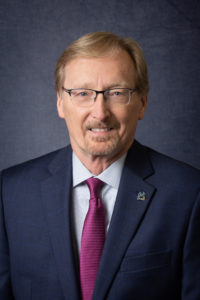Compacts? What happened to the endorsement model of mobility?
Message from the CEO

Recently the Council of State Governments, in partnership with the Department of Defense, announced that it had selected the profession of social work to receive technical assistance from the CSG National Center for Interstate Compacts to develop model compact legislation. The goal of the project: to help military spouses and other practitioners gain professional license portability. CSG selected ASWB as the lead organization for the project.
Mobility: A strategic objective since 2013
In 2013, ASWB identified practice mobility as a strategic objective at the direction of the Board of Directors. Since then, ASWB has done extensive research, collaborated with stakeholders, hosted several education meetings, launched the mobility website MovingSocialWork.org, and published regulatory technology standards and numerous articles on mobility. In 2017–2018, ASWB members adopted a mobility strategy centered on licensure by endorsement, formally implementing it through amendments to the Model Social Work Practice Act. Licensure by endorsement encourages states to recognize a social worker’s existing license in issuing a new one, thus reducing documentation and expediting licensing.
When the pandemic began last March and as it continued through the year, ASWB was aware that discussions about mobility were intensifying in state legislatures and stakeholder groups, especially around electronic practice. State officials were enacting executive orders that allowed greater flexibility both in the use of electronic practice and in physical movement across jurisdictional boundaries to assist with the growing needs and challenges the pandemic created. In the middle of this renewed focus on mobility, the Department of Defense initiated a project to help military spouses gain greater license portability under federal legislation (2019 National Defense Authorization Act). The CSG National Center for Interstate Compacts partnered with DoD on this project and subsequently issued an RFP inviting interested professions to apply for assistance in developing new interstate licensure compacts designed for and responsive to their needs.
We value CSG’s expertise in developing licensure compacts and look forward to leading the effort to develop model language that fits the profession and meets the needs of our member boards.
ASWB became aware of the project and learned that other social work organizations were planning to apply. While recognizing that compacts represent a different model for mobility from the endorsement model adopted through ASWB’s model law, we felt that ASWB, as the regulatory organization, was best positioned to work with CSG in the event that social work was one of the professions chosen to receive its support. After a discussion with the Board of Directors at its January meeting, ASWB submitted an application. CSG announced in March that it had selected ASWB as the lead organization. Subject to a finalized contract, we will work with CSG to identify stakeholders, regulators, and legislators to be part of a technical assistance group that will make recommendations for the structure of the compact. This process will take place over the next year.
Compacts: Another mobility tool
ASWB’s role as a 501(c)(3) organization is to reduce burdens on state governments. We work with our members to help them find solutions to their regulatory challenges. Endorsement fits some of our members, but not all. Compacts were not where ASWB and our members started with mobility, but compacts can coexist with endorsement provisions. State legislatures often dictate the direction for regulatory boards. ASWB’s job isn’t to stand in the way but to facilitate solutions that members need based on their reality. Think of compacts as another tool in the regulatory toolkit. Since a single tool may not be usable by all of our members, ASWB’s goal is to support multiple tools to address practice mobility.
ASWB has made a significant investment in helping member jurisdictions implement practice mobility solutions. We will continue to do so through the many programs and services referenced earlier. Two significant factors are contributing to ASWB’s desire to collaborate with CSG and other social work organizations to develop model compact legislation for social work. First, although licensure by endorsement appears simple to implement, in some cases it does not go far enough—especially as highlighted during this pandemic. Second, CSG will fund all elements of the interstate compact development process, including convening a compact technical assistance group, convening a compact document team, and hosting a national legislative briefing for state legislators. We value CSG’s expertise in developing licensure compacts and look forward to leading the effort to develop model language that fits the profession and meets the needs of our member boards.
Learn more!
On May 20, CSG will host an informational kickoff meeting at 2:00 p.m. EDT over Zoom for anyone interested in learning about the project. We encourage our U.S. member boards to attend the session.

